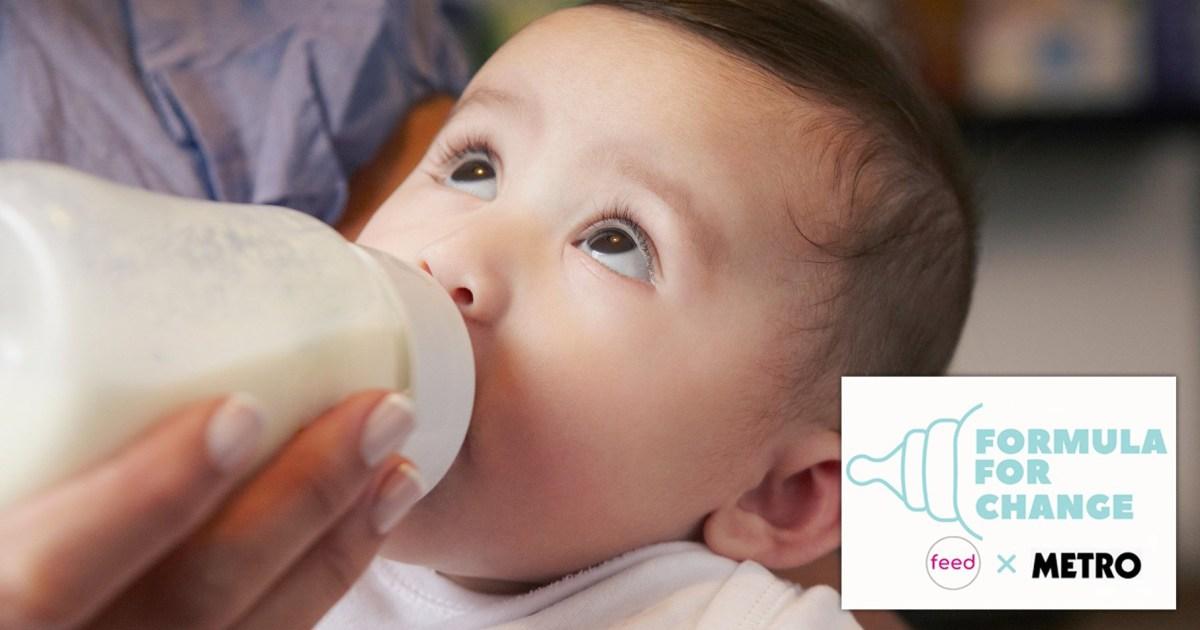The DHSC has confirmed that food banks can set their own policies on whether to distribute infant formula (Picture: Getty)
The Department of Health and Social Care have officially confirmed that there are no UK restrictions preventing food or baby banks from supplying families in need with baby formula.
The clarification marks another positive step for Metro.co.uk’s award-winning Formula for Change campaign, which is calling on the government to review its infant formula legislation.
In correspondence sent to Chris Webb MP, Andrew Gwynne – who holds the position as Parliamentary Under-Secretary of the Department of Health and Social Care – wrote that the Infant Formula and Follow-on Formula (England) Regulations 2007 do not prohibit infant formula being distributed via food banks or where they may issue vouchers to families.
Therefore, he says, food banks can set their own policies on whether to distribute infant formula and the regulations do not prohibit grocery vouchers from food banks or local authorities being used to purchase infant formula in supermarkets.
Mr Webb, who is MP for Blackpool South, insisted that access to formula was vital for families across the UK, explaining: ‘Whether due to medical reasons, feeding challenges, or personal circumstances, many parents rely on formula to provide their babies with the essential nutrition they need to thrive. Yet far too many families are finding it difficult to access this basic need, particularly those already struggling with food insecurity.’
Chris Webb MP has joined forces with Formula For Change (Picture: Supplied)
The issue surrounding the supply of formula at food and baby banks has been complicated due to staff feeling pressure to adhere to UNICEF guidelines – which advise that giving out formula can inadvertently cause harm if babies are given the wrong type.
In response to the latest news, Blackpool Food Partnership – which runs Blackpool’s biggest food bank – has confirmed it is happy to provide infant formula to families in need. Helping Hearts, another charity supporting vulnerable families in Blackpool, will also provide it.
However, some food banks remain reticent, with The Trussell Trust, which supports a network of food banks across the UK, insisting they will continue to follow the advice of UNICEF.
‘All first infant formula is safe and healthy for babies,; says Katherine O’Brien, Associate Director of the British Pregnancy Advisory Service (Picture: Getty Images)
Katherine O’Brien, Associate Director of the British Pregnancy Advisory Service, has previously told Metro that UNICEF’s guidelines don’t add up and that parents should be trusted to make the right decisions for their families.
‘If a mother with financial means can go into a supermarket and be trusted to choose the right formula for her baby, why can’t a mother without the financial means do so in a food bank?’ she argued.
‘All first infant formula is safe and healthy for babies. This is a misconception that needs to be addressed. You shouldn’t feel shamed for choosing the cheaper option. They are all regulated and all first infant formulas are the same.’
‘It’s now more important than ever as so many families are struggling.’ (Picture: Getty Images)
Monique Collins, who ran the foodbank DISC in Newquay, Cornwall until its recent closure previously told Metro that she found UNICEF’s guidance confusing, insisting: ‘We had a midwife come in and tell us we weren’t allowed to supply it but that’s just not true.’
In light of the DHSC’s new comments, she told Metro this week: ‘It’s now more important than ever as so many families are struggling.’
Co-founder of Feed Dr Erin Williams said the government’s confirmation marked a victory for Formula for Change, as ‘supporting families by removing the barriers to affordable and accessible formula is one of our key campaign aims.’
Metro and Feed’s Formula For Change campaign is calling for clearer guidance surrounding the sale and provision of baby formula (Picture: Getty Images)
She added: ‘Feed has developed clear guidance to support organisations in helping families who need formula, which has been backed by the Scottish Government and implemented within the NHS.
‘If providing formula directly, we recommend that organisations provide first infant formula (stage 1), as it’s the only type of formula suitable from birth until age 1. Remember too that all formula brands are nutritionally equivalent, meaning the least expensive brand is just as good for babies as the most expensive, and switching brands is not harmful.’
In light of the clarification, many food banks Metro spoke to said that the DHSC should be communicating the information directly to them, so they feel confident about offering first infant formula to families in need. Until that is done, some admit they remain reluctant to do so.
Formula for Change was launched by Metro in partnership with Feed – in 2023 with an aim to lobby the government to review its infant formula legislation and give retailers the green light to accept loyalty points, all food bank vouchers and store gift cards as payment for infant formula.
The petition has since gained over 100,000 signatures, and had the backing of celebrities including Katherine Ryan, LadBaby and Iceland boss Richard Walker.
Metro has contacted UNICEF for comment.
Get in touch with our news team by emailing us at webnews@metro.co.uk.
For more stories like this, check our news page.
Arrow
MORE: My brother’s death was hard enough – then school bullies made things worse
Arrow
MORE: It took being in labour for 54 hours for midwives to listen
Arrow
MORE: ‘My daughter vanished in 1981 and I will never stop searching for her’
Checkout latest world news below links :
World News || Latest News || U.S. News
The post Win for Metro campaign as government confirms food banks can supply baby formula appeared first on WorldNewsEra.

